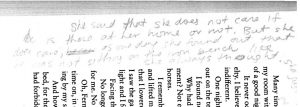The Lover – just no
The Lover by Marguerite Duras.
I cannot say I enjoyed reading this week’s novel as much as I thought I would. Maybe because it was confusing, with the change of perspectives and no clear chronological timeline throughout the novel but with different paragraphs mentioning different events or people in the girl’s life. One page would talk about her son and then the other about when she was fifteen, which was a bit confusing for me. In addition, I thought the younger brother she was talking about was the smallest child until like the last half of the book when she mentioned them being seventeen and eighteen, so I had to look at them from another perspective again.
For me, more than the relationship between the girl and the older Chinese man, I kept my focus more on the dynamics of her family, probably because the parts with the man was so hard to read that I had to take multiple breaks reading it TT. With a dead father and an abusive older brother, it was clear she had issues with the masculine figures in her life, leading to her perverse, weird relationship with an older man. But also about her mother, I could almost relate to her as I have two older brothers, the oldest of which is much much more loved by my mom. It reminded me of the love moms have for their sons, praising them for the smallest things, turning a blind eye to their misdoings because they’re their oh so perfect son. Anyways every character in the book was too depressing that it made it hard to enjoy the book as much!! As much as I love complex, intricate relationships and sad yet beautiful stories, this one was just a bit too much..
The relationship between the girl and the ‘Chinese man’ (which was emphasized a LOT throughout the novel, perhaps to highlight the racial differences as well as their class and age), was very disturbing yet complex. Because it was written from the girl’s perspective, their true actions and the way he is literally grooming her are blurry, leading us readers to think about and even doubt the man’s role in the relationship. It makes me think about how such sickening relationships can be almost seen as ‘acceptable’? just because of the different characteristics of the person in authority. He was less masculine than the average person and was not deemed as powerful because of his race as well as how he behaved. He was ‘scared’ a lot, trembled when he talked to her, which made her think she was the one in control, the object of infatuation. It kind of reminded me of the movie ‘Lolita’, even though I haven’t watched it I know that it is about a relationship between a little girl and an older man, and is discussed about to almost ‘fool’ other girls into thinking it was a love story when in fact it was not.
“He’s twelve years older than I, and this scares him. I listen to the way he speaks, makes mistakes, makes love even—with a sort of theatricality at once contrived and sincere.”
Also I just found out that the author also wrote the script for ‘Hiroshima mon amour’, which is a french new-wave movie I’ve been wanting to watch for a long time!! There may lie similarities between the two pieces and I will be analyzing them!!
My question is:
Do you think ‘The Lover’ as a title was trying to define the girl or the man? Or does it have a different meaning?

